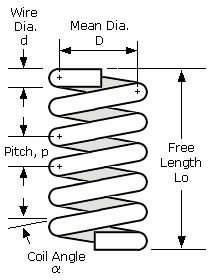Compression Coil Spring Constant - What is Shear Modulus? - by John Sinitsky
Introduction
The compression spring is a basic standard part used in a wide variety of machine design applications and mechanisms. In the Compression Spring Design article, we presented the basic formula for any spring constant:
F = kΔH = k(Hfree-Hdef)
where Hfree is uncompressed spring length and Hdef is spring length as a result of force applied,
and the basic formula for a compression coil spring constant
k = (Gd4) / 8D3Na
where G is the Sheer Modulus of the spring material, d is the wire diameter, D is the spring mean diameter, and Na is the number of active coils.
Below we will look into ways that the material affects the spring constant:
Shear Modulus
The Shear Modulus is a material property, which cannot be altered– except for various special thermal treatments, of course, which are hardly part of compression coil spring design. What an engineer can do to change the spring constant via shear modulus is choosing another material. This is a fairly easy procedure, as most manufacturers have various on-shelf springs, produced from different materials. Another advantage of altering k via G is that there is no need to check and change the other parts of the assembly– spring dimensions remain the same! Bear in mind, however, that altering spring constant will necessarily lead to a different deflection as a result of the applied load.
Various Spring Materials
The most common, available, and affordable materials for coil springs are ASTM A228 (also called Music Wire) and Hard drawn ASTM A227.
The Stainless Steels used for springs are AISI 302, AISI 304, and PH 17-7, the latter being having a relatively high UTS strength and shear modulus.
Some more exotic materials include chrome-vanadium ASTM A231 and chrome-silicon ASTM A401. Those are intended mainly toward applications with high stresses and possibility of fatigue failure.
For corrosion resistance – turn to Nickel based coil springs, with A286 being an excellent and most common choice.
Tolerancing
The values of Shear modulus for most materials are available in literature. However, if the data is not present it is common practice to use about 0.45-0.55 of the material σUTS value. It must be noted that the Shear Modulus is obtained by experimental ways, thus the values tend to be inaccurate and may vary around 15% of the “nominal” value. Fortunately, this parameter appears in the k formula in the power of 1 and thus has a relatively small effect on the spring constant.
